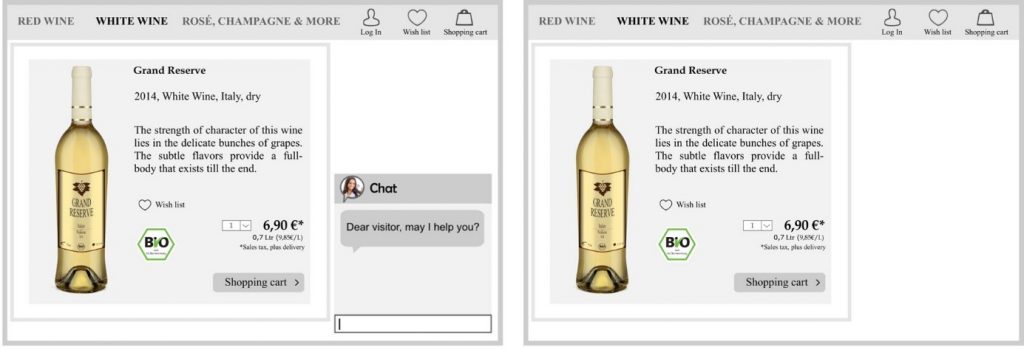By Stefanie Sohn
Although organic wine with its benefits like healthiness and environmental friendliness has become an increasingly important factor for worldwide market growth, consumer purchasing of organic wine is still far behind that of non-organic alternatives (Jorge et al. 2020). Therefore, this study seeks to understand which factors might determine consumer purchasing of organic wine. Online retailing has evolved to an important distribution opportunity for wines (Rannekleiv et al. 2019). Hence, the current work focuses on the online context to develop an understanding of organic wine purchasing. More specificially, this research proposes that the mere presence of social cues on a retailers’ website exerts an effect on the purchasing of organic wine. Cues based on human characteristics (e.g., social cues) are of particular importance in online retailing because they compensate for the impersonal nature of those environments (Wang et al. 2007). Through social cues, consumers are given opportunities to experience or interact with humans (e.g., peer buyers). However, their mere presence does not imply an interaction. Moreover, social cues are an example of social factors that also include factors such as social desirability, social identities and social norms (White et al. 2019). Social desirability, social identities and social norms have been found to be one of the most influential factors in terms of effecting green or sustainable consumer behavior (Abrahamse and Steg 2013). Based on this knowledge, the current study proposes that social cues might be similarly relevant for sustainable purchasing decisions such as organic wine purchasing. Scholars have shown that retail atmospherics like social cues might impact product purchasing in offline (e.g., Turley and Millimam 2000) as well as in online retail settings (e.g., Eroglu et al. 2003). However, insights are missing on how they affect organic wine purchasing (Wiedmann et al. 2014). Their role has also been overlooked with regard to online wine purchasing (Cho et al. 2014) and wine purchasing in general (Lockshin and Corsi 2012).

To test the hypotheses, this study employed an online experiment and an online survey. For the experiment, two pictures of a fictional, wine-selling online store were developed. The pictures created for both the control and the experimental group display a bottle of white wine from a fictitious brand. The displayed website uses conventional website elements (e.g., a shopping basket) and depicts additional product information to enhance external validity. To present an organic product alternative, this research inserted an eco-label that was displayed next to the bottle of wine. To manipulate the presence of social cues, this study follows established methods. Therefore, the experimental, in contrast with the control group, sees a chat window through which website visitors could interact with the online retailer.

This study demonstrates how social cues shape organic wine purchase intentions. In particular, this research reveals that the presence of a chat box on an online stores’ website indirectly influences the consumer purchase intentions of organic wine. More specifically, the presence of a chat box elicits perceptions of social presence that affect trust at different levels; trust perceptions then translate into purchase intentions. Further, it can be stated that both internal (i.e., familiarity with organic wine purchases) and situational factors (i.e., nature of the shopping task) do not influence the effects of the mere presence of a chat box.
From a practitioner perspective, this study underlines the importance of a conscious selection of atmospheric cues for the design of online stores because they elicit website experiences that guide organic wine purchasing. Retailers can enhance organic wine sales by increasing the level of social cues on their websites, for instance, by using chat boxes. Other social cues that might elicit similar effects are customer reviews or human pictures. Thus, encouraging past purchasers, for instance, to leave a comment and placing these comments close to the organic wine might positively affect future purchasing. Further, practitioners might want to test how these social cues work separately or in combination, also with the aim to create purchase-relevant website experiences. Finally, retailers should try to warrant trust in their online store, for instance, by identifying additional factors that foster website trust perceptions because website trust perceptions confer effects on the purchasing of individual products from the online store. For instance, the presence of website security certificates might evoke the intended effects.
The entire research paper is available for free under: https://www.mdpi.com/2304-8158/9/5/643

Stefanie Sohn is an assistant professor at the Southern Denmark University, department of sociology, environmental and business economics. Her research is focused on online retailing, sustainable consumption, and new retailing technologies. The present study is part of a larger research project on consumers’ sustainable consumption that was primarily funded by the German Federal Ministry of Education and Research (grant number 01UT1429D). Barbara Seegebarth and Stefanie Sohn worked on this project for a period of three years.
References
- Abrahamse, W.; Steg, L. Social influence approaches to encourage resource conservation: A meta-analysis. Glob. Environ. Chang. 2013, 23, 1773–1785.
- Cho, M.; Bonn, M.A.; Kang, S. Wine attributes, perceived risk and online wine repurchase intention: The cross-level interaction effects of website quality. Int. J. Hosp. Manag. 2014, 43, 108–120.
- Eroglu, S.A.; Machleit, K.A.; Davis, L.M. Empirical testing of a model of online store atmospherics andshopper responses. Psychol. Mark. 2003, 20, 139–150.
- Lockshin, L.; Corsi, A.M. Consumer behaviour for wine 2.0: A review since 2003 and future direc-tions. Wine Econ. Policy 2012, 1, 2–23.
- Turley, L.W.; Milliman, R.E. Atmospheric effects on shopping behavior. J. Bus. Res. 2000, 49, 193–211.
- Wang, L.C.; Baker, J.; Wagner, J.A.; Wakefield, K. Can a retail web site be social? J. Mark. 2007, 71, 143–157.
- White, K.; Habib, R.; Hardisty, D.J. How to SHIFT consumer behaviors to be more sustainable: A literature review and guiding framework. J. Mark. 2019, 83, 22–49.
- Wiedmann, K.-P.; Hennigs, N.; Henrik Behrens, S.; Klarmann, C. Tasting green: An experimental design for investigating consumer perception of organic wine. Br. Food J. 2014, 116, 197–211.


[…] Science and Wine: Social cues and the online purchase intentions of organic wine […]